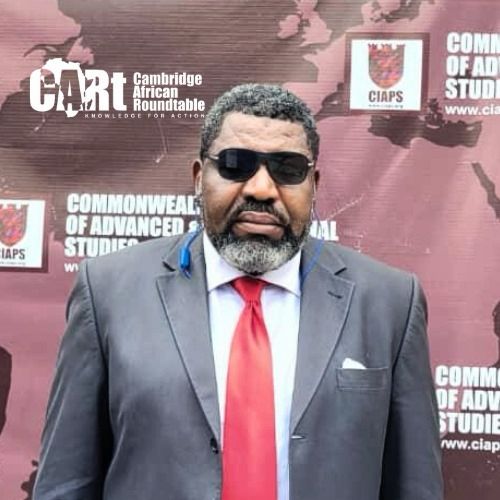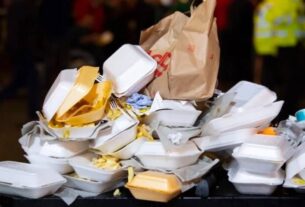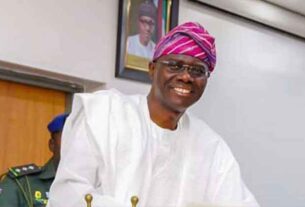by Olayiwola Oshunrinade
Anthony Kila, a Professor of Strategy and Development and the Centre Director of the Commonwealth Institute of Advanced and Professional Studies (CIAPS), Lagos, has said that the Nigerian constitution should be changed now, saying that this would go a long way to help the nation.
Kila said further in an interview that everybody is a product of the system under which he operates, and added that the reason nations such as the United Kingdom or the United States of America are making progress is because there are consequences for whatever anyone does.
The accomplished analyst and public commentator stated further that man is a product of the system in which he operates.
“Specifically, the first key words in the Nigerian constitution is wrong, it says; ‘we the people of Nigeria.’ If the first thing that brings people together is a lie, how can we expect something good to come out of it.
“The Christian book says ‘if the foundation is faulty what can the righteous do,’ so the constitution needs to be changed.
“I am the Chairman of the Constitution Review Committee of the Patriots and we met the President recently. I believe that the constitution of the future should be based on devolution of power, and decentralisation of processes.
“It should be such that the people should be aware of it and be involved. What we have now, even if you put a saint there he might turn out to be a devil because the system is not built for the people. The government and the president are too powerful.
“Those who said we should go back regional system are right. At least, they should decentralise it anyway they can,” he said.
On the promise of better days for Nigerians, Professor Kila said that it is a good thing if the federal government promised that there are better days ahead because they realised that today is not good for many people.
He stressed that the dramatic increase in the cost of living and prices of goods and services, cost of transportation and the low availability make life difficult for many people.
He said; “When they say better days are ahead, it shows that they know what is happening. But, the question is that what are they doing to make things happen, that is my concern.
“There are two questions, how did we get here and what are we doing to get out of it. That is where my concern is. In terms of good intention, they have it.
“They are high on good intentions, but low on results and policies. I score them low on policies and results, but high on intention.
“We got to the current situation by the removal of fuel subsidy and floating of naira. We stopped defending the naira by the unification of the forex window.
“On the removal of fuel subsidy, there is a predominant views in the country over the belief of some people that the removal of fuel subsidy is right, some people have even applauded it.
“But I disagree, I disagreed with the removal of fuel subsidy under former president Goodluck Jonathan and I still disagree now.
“My disagreement with former president Goodluck Jonathan then was not personal contrary to the views of some people. It’s not that I hated the president, it’s not partisan, but as at the time they wanted to remove fuel subsidy about 12 years ago, as trained economists, some of us were able to predict that if they did that people would suffer as prices of goods would go up.”
Kila stated that those things that were predicted are now happening, and that some people who were with people like him then made a career out of the issue of no fuel subsidy removal, but that now they are for fuel subsidy removal.
While saying that he has left everybody to his or her conscience, he could understand that the country is broke and that it might be difficult to maintain the fuel subsidy regime.
He said that the wealth of the nation was squandered, adding that if he had his way, he would have looked for those who looted the nation’s money.
“It is not a very difficult thing to do because the people involved are less than 10,000. I think with a bit of determination, we can look for those who looted our money.
“The other problem we have is the unification of the forex window. I always tell my colleagues and those around them that it looks good on paper as you get rid of round tripping and stuffs like that, but the fundamental flaw is that the policy works in countries that export less items.
“It works where you produce a lot of things, you attract a lot of forex and people buy from you. In Nigeria, we consume more than we produce, we import more than we export.
“So, having a weak naira creates pressure and increases the prices of goods and services, I think we need to reverse that. But based on macro economics, the main problem in the country is hunger, high cost of living, increase in transportation, lack of employment and others.
“These are basic things. So on what can be done, if I were in the villa or if I were to advise the President, I would say that there are three things that we need to do right now. Number one is to reduce the prices of products and services by producing more, you need to increase the supply,” he said.
Professor Kila explained further that the next thing is to reduce the cost of goods and services by varying the demand.
The next one, he said, is to find a way to intervene directly, which he said is a radical thing to do.
He said that this would be done by reintroducing fuel subsidy, adding that if the government could crash the price of energy; petrol, diesel and electricity, then they would reduce the price of every other thing.
“I don’t know how possible that would be because we are broke. But if we suspend some of the things we are doing now, we will be able to do that.
“The other thing is to vary the demand, which will reduce the prices of goods and services. The way to do that is to have more public services, the government should provide more public transport.
“If people that go to work in their private cars should stop using their cars it would reduce the demand for fuel. People can go on public transport, train or on water and that would reduce the number of people buying petrol and the cost of energy.
“We all need to change our lifestyle. If you are eating fresh fish, you can go for frozen fish. People should do less of manicure and pedicure. If they do it every week, may be they should now make it monthly. People can go for low cut rather than going to the barbers every week.
“The third one is to increase our production. It is easy to target producers, manufacturers and farmers by direct intervention.
“We can provide security for the farmers in the farm, subsidise energy for producers, we really need to produce and get things to the market. There is also a radical approach that I have, which is that we should start importing foods, we should import ships of foods that would cover for the next three to six months, why we are producing our own so that we crash the prices,” he stated.
He explained further that importing food is to help the nation’s agriculture, and that it’s not going to kill Nigerian agriculture, but that it would help it.
According to him, that way, the country is only trying to nurture her agriculture, but that the nation should import food so that the people would not die in the process.
“My position on that is that we should take a different approach. At the level of purchase, we pay little amount of money.
“Some of my colleagues and I know that there are so many countries in the world that are looking for who would buy what they are being paid to destroy. In some of parts of the world, the governments pay some people to destroy what they produce because they produce so much.
“This is because the government does not want them to bring too much of the items into the market or else it would crash the price and people would stop producing it.
“So, the government subsidises agriculture so that the people can keep producing. We can tell them to give us those items and we will buy it at a better rate.
“We could make arrangements to buy them without affecting our naira by doing exchange with them. We can even give them our oil in exchange for the items, so there are ways to do this. We just need to think out of the box.
“Also, we can take them as loans, it doesn’t have to be direct, and it doesn’t have to be crude oil, it can be other materials. For instance, we can buy rice and pay for it with rubber.
“My major problem with the government is that when they say that better days are coming, they are not showing us the path. I think that before now, like a year ago, the president should have told the people that ‘there is trouble, we are going to do certain things for the next one year and this would be the results of what we are doing.’
“If they said that the former administration caused trouble for us, what are they doing about it? If you have a household with a father, mother, children, aunty and what have you, the head of the house can call a meeting and say ‘look, our income has reduced, so let us sacrifice this year, no holiday this year, the money for that would be used for somebody’s tuition.
“Let us not buy ‘aso ebi’ for the next six months, we will use the money for something else.’ If everybody sees the sacrifice they are making, and this is what they would use it for, it would give them a sense of understanding.
“The pain would be there, but it would be less because it would be a justified reason. I hope better days are ahead, but as an economist, I would say that better days are not ahead,” he said.
On Dangote Refinery and the nation’s refineries, he said that the fact that Nigerian refineries are not working is a painful indictment of the leadership of the country.
He stated that this shows how terrible people have been, and that those who say that if the nation has more refineries and that if her petroleum products are in the market it would make the price of petroleum go down, are right.
He said; “We should also be able reap the benefits of the by-products of petroleum. I think the government should do the right thing and we the people should keep pushing them.
“If the government cannot handle the refineries, they should invite local and international investors. When Dangote Refinery came on board, I said I am very happy. One thing about Alhaji Aliko Dangote is that he stands by his businesses by putting his name on them, there are some people who don’t do that, I don’t know why.
“Dangote is worth all the respects, but the fact is that it’s a personal venture and he has to make profits. But if the government is interested and involved in it, they would benefit from the commonwealth for Nigeria.
“It is real time to ask why the refineries in Port Harcourt, Rivers State, Warri, Delta State and the one in Kaduna are not working. May be we should go there and ask them, what is the problem. It’s just like when a car or borehole is not working, you ask why they are not working and look for the repairer.”








